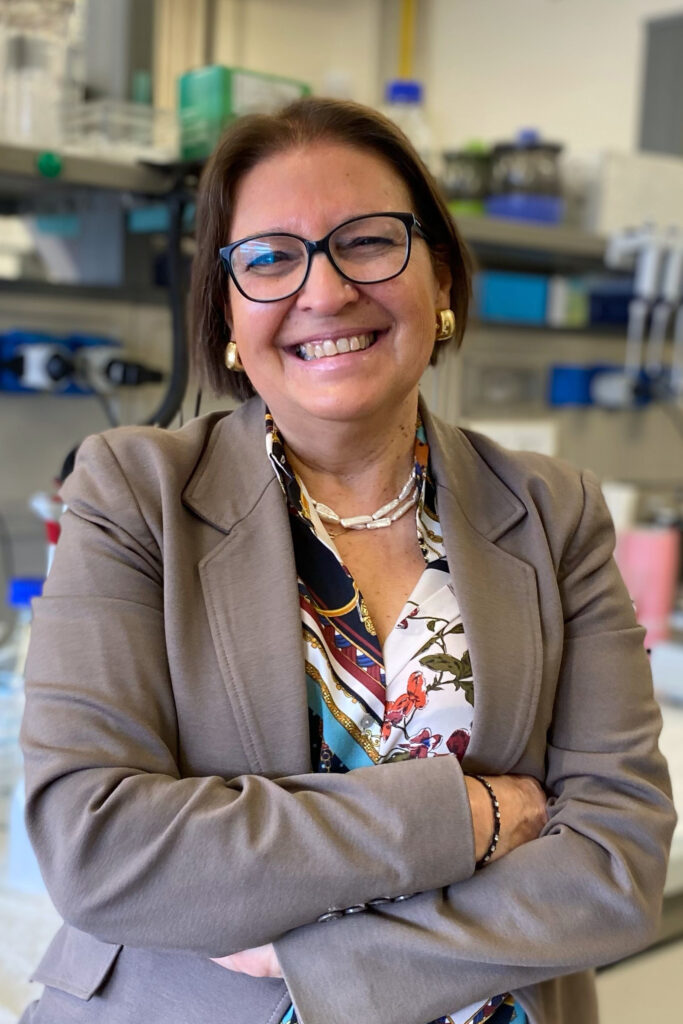
Experimental Neuroscience
Associate Professor in Biochemistry
School of Medicine and Surgery, University of Milano-Bicocca
ORCID ID: 0000-0002-1045-8838
SCOPUS Author ID: 58512532300
- 1985- Degree in Biological Sciences;
- 1986-Post-Degree fellow, Department of Physiology and Biochemistry, (Transport section), Science Faculty, University of Milan;
- 1991- Ph.D. Biochemistry; (Proteins and gangliosides interaction in the membrane);
- 1992-1993 Post-doctoral fellow, Department Chemistry and Biochemistry, Medical School, University of Milan;
- 1994-1999 Researcher, Department Chemistry and Biochemistry, Medical School, University of Milan;
- 1999-2000 Biochemistry Researcher, Medical School, University of Milano-Bicocca;
- 2000- today Biochemistry Associate Professor, Department of Medicine and Surgery, University of Milano-Bicocca;
- 2013-2015 Director of Graduate School in Nutrition, Department of Medicine and Surgery, University of Milano-Bicocca;
- 2014- today Director of Master of Nutrition and Applied Dietetic, Department of Medicine and Surgery, University of Milano-Bicocca, Milano, Italy.
INTERNATIONAL EXPERIECES
1992-Prof. TE Thompson Dept. of Biochemistry, Medical School, University of Virginia, Charlottesville, VIRGINIA; USA: Glycolipid domains studied by electron microscopy; 1994-EMBL fellowship (European Molecular Biology Laboratories), Heidelberg, GERMANY: Ganglioside-proteins interaction in caveolae. 1999- Dr.Joseph Brunner, ETZH, Zurich, Switzerland: Lipid-Protein interaction.
RESEARCH TOPICS
The scientific interests of Prof Paola Palestini, in the last years, are addressing to 2 main topics: a. Function and structure of lipid rafts in nervous system using in vitro model (rat cerebellar granule and hippocampal cells), focusing the attention on the microdomains containing the Prion and Amyloid Proteins. b. Effect of air pollution (particular matter, PM) on health. Particulate matter exposure is thought to induce harmful biologic pathways, both acutely within days and chronically exposure persists for years or a lifetime. Large time series analyses have been conducted in North America and Europe to estimate the acute health risk of PM exposure. In particular, the accumulating evidence for a clear association of PM exposure with increased cardiovascular morbidity and mortality.
Evidence is accumulating to support that exposure to ambient air pollutants, especially particulate matter, contributes to increased risks and poor outcomes of various neurological disorders. Ambient fine particle, a ubiquitous exposure largely generated by combustion processes, has been recognized as a pervasive threat to cardiovascular health. An increased risk for stroke was observable even at relatively low levels of exposures. Earlier neuroepidemiological reports also linked PM to relapses in multiple sclerosis. More recent studies reported adverse effects of ambient air pollutants on cognitive decline and accelerated brain aging.
For these reasons, the studies of Prof Paola Palestini focused on the molecular mechanisms involved in cardiovascular and neurodegenerative diseases. For these studies are used both in-vivo models (mouse) and in-vitro model (alveolar, endothelial and neuronal cells in culture). She is member of scientific committee the research centre “Polaris” (Polveri in Ambiente e Rischio per la Salute) of the University of Milano-Bicocca, which aims at better investigating nano- and micro-particles in the environment pollutant and their direct impact on human health.
Recent researches are addressed in analysis of the anti-inflammatory and antioxidant properties of phytoextracts of different origins. She is in the Italian sustainable universities network (RUS) workgroup, which elaborated the 2 national questionnaires on eating habits and food consumption addressed to the university population. She is in the workgroup that developed the Food Policy guidelines on University Canteens (Municipality of Milan, Cariplo Foundation).
ADDITIONAL DETAILS
Prof Paola Palestini is author of about 100 articles published on International Journals and of 130 communications of international and national congress.
Updated pubblications list on PubMed
SCOPUS: Author ID: 7003442377 http://orcid.org/0000-0002-1045-8838. h-index: 31; Documents: 103; Total Citations: 3012 by 2280 documents.
WEB of SCIENCE h-index 30; Documents 125; Total Citations: 2886. GOOGLE SCHOLAR h-index 36; Documents 190; Total citation 4157.
RESEARCH GATE h-index 34; Documents 131; Total citation 3738